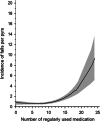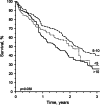Association of medication use with falls and mortality among long-term care residents: a longitudinal cohort study
- PMID: 37331981
- PMCID: PMC10278366
- DOI: 10.1186/s12877-023-04096-6
Association of medication use with falls and mortality among long-term care residents: a longitudinal cohort study
Abstract
Background: Falls in long-term care are common. The aim of our study was to explore how medication use is associated with incidence of falls, related consequences, and all-cause mortality among long-term care residents.
Methods: Five hundred thirty two long-term care residents aged 65 years or older participated in this longitudinal cohort study in 2018-2021. Data on medication use were retrieved from medical records. Polypharmacy was defined as use of 5-10 medications and excessive polypharmacy as use of > 10 medications. The numbers of falls, injuries, fractures, and hospitalizations were collected from medical records over 12 months following baseline assessment. Participants were followed for three years for mortality. All analysis were adjusted for age, sex, Charlson Comorbidity Index, Clinical dementia rating, and mobility.
Results: A total of 606 falls occurred during the follow-up. Falls increased significantly with the number of medications used. Fall rate was 0.84/person-years (pyrs) (95% CI 0.56 to 1.13) for the non-polypharmacy group, 1.13/pyrs (95% CI 1.01 to 1.26) for the polypharmacy group, and 1.84/pyrs (95% CI 1.60 to 2.09) for the excessive polypharmacy group. Incidence rate ratio for falls was 1.73 (95% CI 1.44 to 2.10) for opioids, 1.48 (95% CI 1.23 to 1.78) for anticholinergic medication, 0.93 (95% CI 0.70 to 1.25) for psychotropics, and 0.91 (95% CI 0.77 to 1.08) for Alzheimer medication. The three-year follow-up showed significant differences in mortality between the groups, the lowest survival rate (25%) being in the excessive polypharmacy group.
Conclusion: Polypharmacy, opioid and anticholinergic medication use predicted incidence of falls in long-term care. The use of more than 10 medications predicted all-cause mortality. Special attention should be paid to both number and type of medications when prescribing in long-term care.
Keywords: Falls; Long-term care; Mortality; Polypharmacy.
© 2023. The Author(s).
Conflict of interest statement
The authors declare that they have no competing interests.
Figures
References
-
- Rubenstein LZ. Falls in older people: epidemiology, risk factors and strategies for prevention. Age Ageing. 2006;35 Suppl 2:ii37-ii41. 10.1093/ageing/afl084. - PubMed
-
- de Vries M, Seppala LJ, Daams JG, van de Glind EMM, Masud T, van der Velde N, et al. Fall-Risk-Increasing Drugs: A Systematic Review and Meta-Analysis: I. Cardiovascular Drugs. J Am Med Dir Assoc. 2018 Apr;19(4):371.e1–371.e9. 10.1016/j.jamda.2017.12.013. - PubMed
MeSH terms
Substances
LinkOut - more resources
Full Text Sources
Medical



